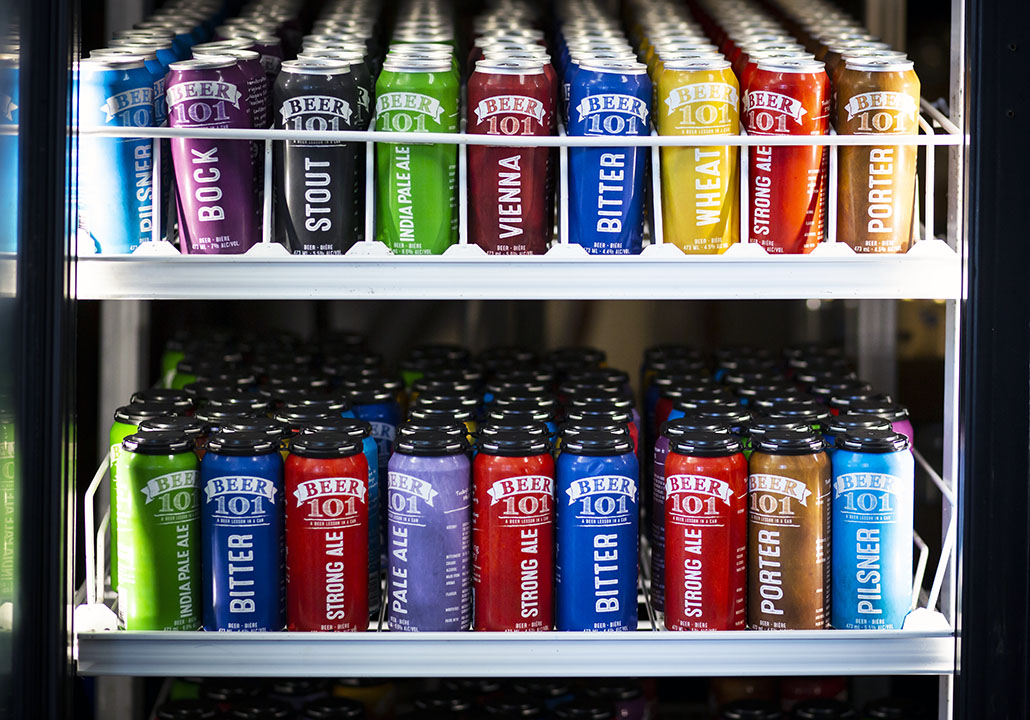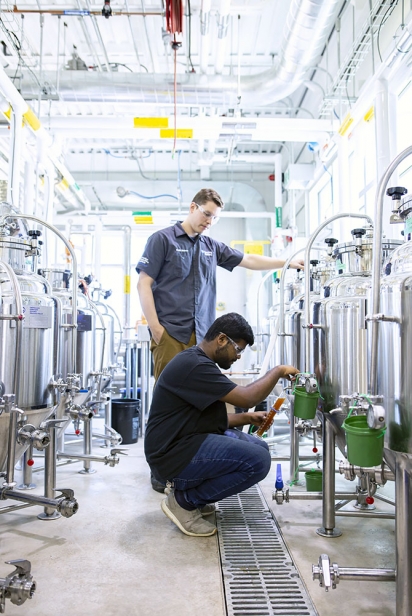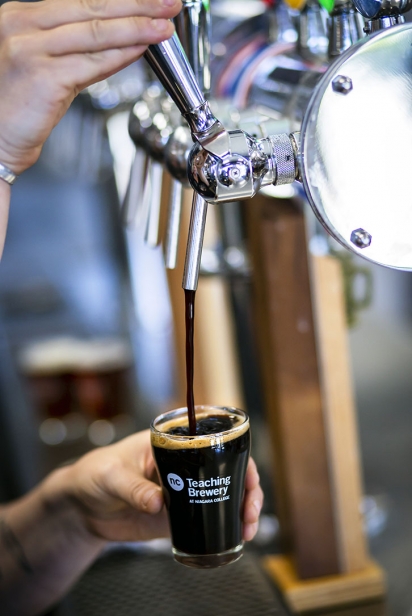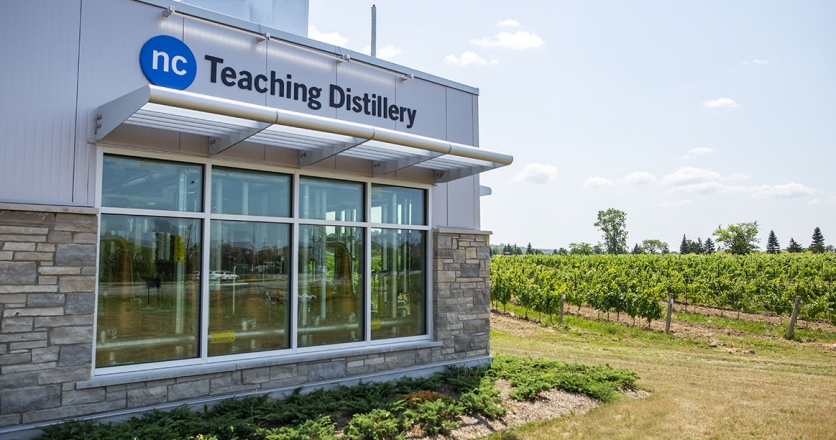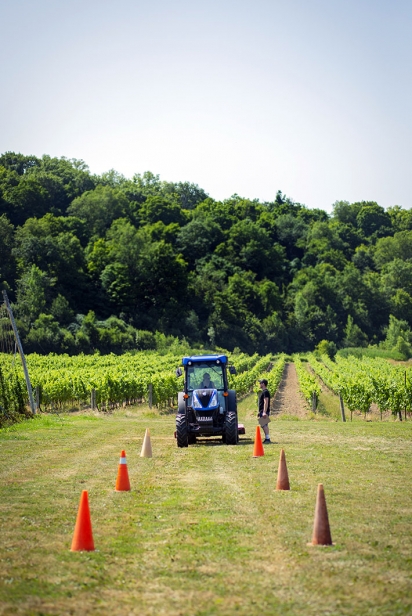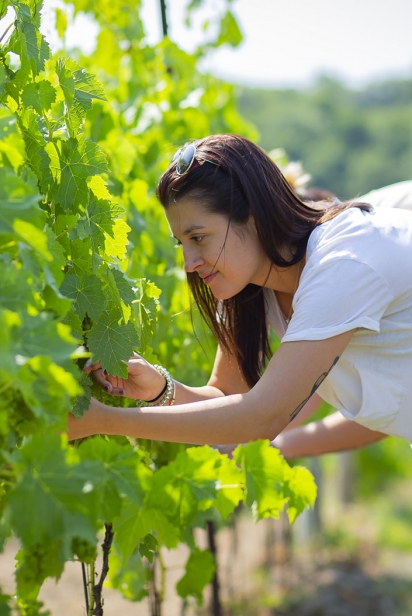A College of Firsts and Thirsts
Michael Bright dreams of seeing his name on a bottle of spirits. Vodka, gin, Canadian whisky — it doesn't matter. His dream is to put his indelible mark on any of them. As the newly hired inaugural head distiller at Niagara Distillery, he'll soon be doing just that.
Even better, Bright got the job a few days before graduating with his certificate in artisan distilling from Niagara College.
But such is the perk of being part of the college's first graduating class of distillers — of being part of the only such course in Canada, really — and being fully trained to take the reins in an industry set to explode in Ontario.
"At some point, that's the dream for a lot of people in the program — to have their name on a bottle," Bright says. "I think I'm going to have a really good career out of this."
The artisan distilling program is the latest education-to-industry pipeline in food and beverage, established by the college and overseen by its burgeoning Canadian Food and Wine Institute (CFWI).
And given the CFWI's history, Bright's confidence about his future as a distiller isn't just new graduate bravado. The CFWI has a knack for positioning itself as a leader in educating tomorrow's chefs, brewmasters, distillers, winemakers, cider-makers, sommeliers — even tea sommeliers — and food scientists.
Take that brewmaster program, for example. It was the only one of its kind in Canada when it launched in 2010 with 24 students, one for every bottle in a case of beer. Other than post-graduate programs in California or Scotland that were rooted in theory, there was no formal brewmaster training program offered by a post-secondary institution before the college stepped up.
"No one else was really doing it in the world," says Jon Downing, brewmaster professor.
Three years after the program launched, Downing, who approached the college about starting it, was getting 22 applicants for every space in his class. Admission wait lists were as long as a brewing paddle. Students lucky to get into the program were often hired in their field before the ink dried on their graduation certificates.
Nine years later, Ontario is home to some 300 craft breweries. There were only 60 when that first brewmaster class at the CFWI learned how to use a mash tun. Graduates, and the program, get credit for some of the growth with many opening their own breweries after finishing school. Left Field, Collingwood, Brothers Brewing and Grey Matter Beer Company are but a few examples of successful suds-makers helmed by CFWI brewmaster alumni. "The craft brewing industry wouldn't have grown as fast in Ontario without the program," says Steve Gill, general manager of the college's learning enterprises. "The college is pre-emptive. It launches programs that help the industry. We were at the top of the wave for beer. We grew with the industry. The majority of breweries in Ontario have one of our graduates. With distilling, the program launched just ahead of that wave, positioning our students to be important to that industry."
Eight years before the brewmaster program, the Niagara College Teaching Winery opened as the first commercial teaching winery in Canada in 2002, complementing the winery and viticulture technical program launched in 2000. It's since turned out winemakers, viticulturists and wine business minds that have established domestic tipple as a world-class product.
They've also defined emerging wine regions elsewhere, including in Virginia, where one CFWI graduate, Jordan Harris, has helped to catapult the industry beyond novelty status, fermenting awardwinning vintages and being named one of the Top 100 Influential Winemakers in the U.S.
Ask anyone within six degrees of the CFWI and they'll credit the college's leadership for its keen sense of opportunity for filling long-overdue voids in the food and beverage industries. Before Dan Patterson stepped into the role of college president in 1995 to grow the depth and breadth of programming offered by the institution — tripling enrolment in the process — Niagara College was cast as a bit of a Last Chance High.
Jockeying to be the first and often the only place to learn the tricks of the food-and-drink trades has ultimately positioned the CFWI as one of the college's crown jewels. It's also become the Canadian forerunner for an education in all things comestible and potable.
And why not? The CFWI, located at the college's Niagara-on-the-Lake campus, might lack the big city-allure attached to other culinary programs in larger centres, but it has something that no other existing program ever will.
"The thing about Niagara College is where it is," Bright says. "It's really in the heart of the wine and food and hospitality sector. You know when you go there, you're going to get people teaching you who have hands-on experience."
That didn't go unnoticed by Craig Youdale when he visited the college in 2006 to do an external review of the culinary and wine programs as part of the College's quality assurance process. Youdale, who was a professor and program co-ordinator at the Culinary Institute of Canada at Holland College in Charlottetown, P.E.I., at the time, noted in his final report all the potential that existed for the programs, given the surrounding resources. He wrote about Niagara's continued growth in tourism and its wine, culinary and agricultural assets, drawing attention from farther afield.
The proximity of the college to it all, especially the produce, made the culinary and wine programs a veritable "Disney Land" for staff, he says.
"To have the school, literally, geographically dab smack in the middle of this had great potential compared to other schools," says Youdale today, who was wooed to work at Niagara College in 2009 before becoming CFWI dean in 2014. "There were things about Niagara — and I've travelled all over the world — that no other school has in its backyard. Everything Niagara has, especially in Canada, there was nothing else like it and no one had access to it."
Leveraging all that started with rebranding the 40-year-old culinary program and its younger wine offshoot. Enter the Canadian Food and Wine Institute moniker with all its cachet. "To solidify everything in one unit, we decided on a national name because this was so unique and we thought all of Canada would find it unique," Youdale explains.
The institute expanded buildings, added kitchens and recruited top culinary talent to teach. In 2007, it created sensory labs for use in culinary and wine programs, often bringing students in each cohort together to glean essential knowledge of food and wine pairing that's critical to succeeding in either industry. Today students in all CFWI programs come together to use the space and learn about working together.
Next came the Wine Visitor and Education Centre, which opened in 2009, part of a $90-million campus redevelopment. The teaching brewery was "the next logical step" in 2010, Youdale says. And ditto for distilling in 2018.
Meanwhile, connecting with the horticulture program tapped into the college's greenhouse as a place to grow more food for use in the culinary courses. Horticulture students started working with beekeeping students (neither program falls under the CFWI umbrella). Winery and viticulture technician students have used honey harvested by their beekeeping peers to make mead. No one is learning in silos here.
"There are culinary schools all over the world that can buy honey and wine and beer, but when you have access to all of this on campus, it's a unique product that no one else has," Youdale says. "It's not just a culinary school. It's other aspects that go with it. It's not just a beer school. It's not just a wine school… and that's what makes the school interesting."
The next step? Figuring out how to marry the college's commercial cannabis production and culinary programs once the green light is given for marijuana-containing edibles. "We're already looking at what we can do," Youdale says.
It's novel, but it's also impactful, Gill notes. One need only look at where graduates, including Harris, his winemaking classmates, brewmaster colleagues and chef's jacket-sporting peers, have gone. They're making names for themselves while ultimately bolstering economic development. But one newer facet of the CFWI is homing in on the finer points of economic growth in food and beverage. The CFWI Innovation Centre is a four-year-old venture bridging the college and business community by helping established and start-up food and drink enterprises do everything from nutrition labelling and shelf-life testing to consumer sensory feedback and product commercialization. In some cases, CFWI students are hired to assist with research, often landing permanent work with the company they've helped after the project wraps.
The Innovation Centre has helped vinegar giant Reinhart's Foods develop and launch Reinhart's Red Apple, a light hard cider ranking among the top five selling ciders in Ontario in 2018.
It's also worked with celebrity chef Vikram Vij to obtain federal approval for the processing plant manufacturing his Vij at Home line of foods so he could take it nationwide.
Bald Baker, Iron Will Raw pet food, Bacardi, SIAL and OLiV International are just some of the other local, national and international companies that have tapped the CFWI Innovation Centre for guidance in launching or ramping up their businesses. The demand for the centre's academic and non-academic services, housed in the basement of the CFWI, is one reason for the centre's 4,500 square-foot expansion in the new Marotta Family Innovation Complex. The four-storey addition will support and grow the agri-food sector through research and innovation, trade incubation and student training facilities.
The innovation centre tackles an average of 100 industry-driven projects a year and has created nearly 350 jobs as a result of its business development efforts since 2004.
"We are an enabler, we are an accelerator," says Lyndon Ashton, CFWI Innovation Centre manager. "This about enabling [business] success."
Really, though, it's also about being the little college that could — and is. "The number of firsts established here — the first teaching winery, the first teaching brewery, the first teaching distillery, the first commercial cannabis production program — all of these firsts, it has to do with the culture," Ashton says. "And how we've continued to invest in student learning and innovation."
Canadian Food and Wine Institute at Niagara College
135 Taylor Rd., Niagara-on-the-Lake, Ont.
canadianfoodandwineinstitute.ca | 905.641.2252 | @niagaracollege


